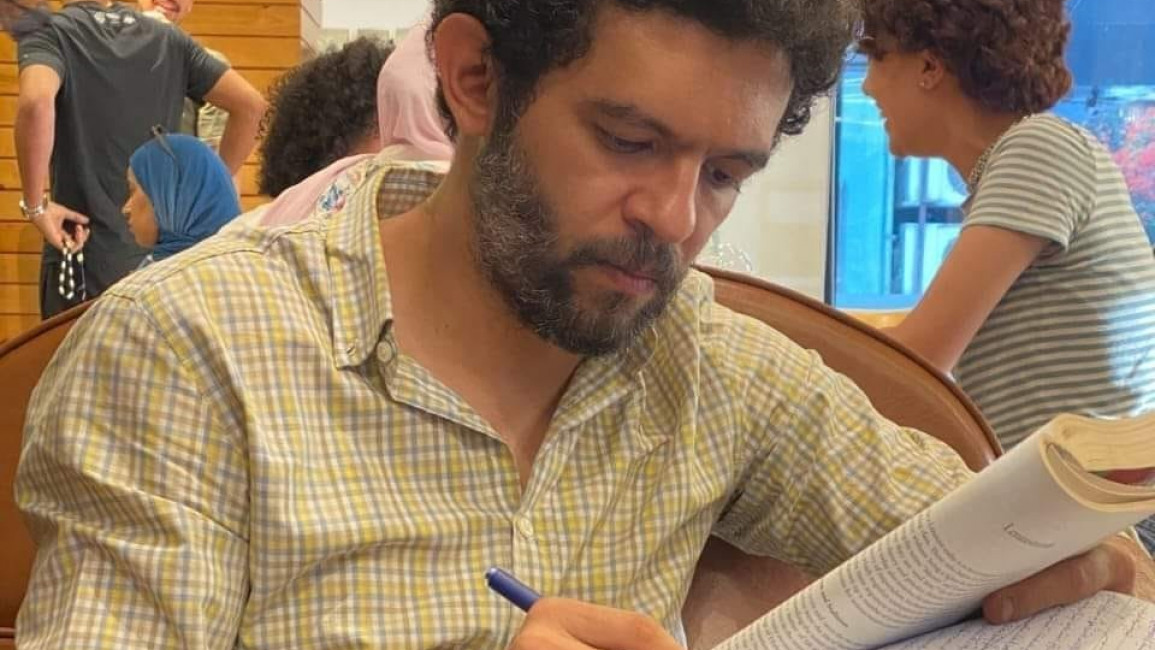'Jailed for stating the obvious': Egyptian cartoonist Ashraf Omar’s wife, Nada Mougheeth, speaks about his plight
It may have never occurred to 38-year-old Egyptian cartoonist Ashraf Omar that his satirical caricatures about the government's controversial polities would lead him to face terrorism-related charges.
For weeks now, his case triggered public outcry on increasing restrictions over free expression in the Arab World's most populous country.
The hashtag "Free Ashraf Omar" has trended throughout Egyptian and Arab social media platforms, with activists calling for his immediate release. Meanwhile, Omar's cartoons have been widely shared too.
Omar's wife, Nada Mougheeth, spoke with The New Arab about his case and the personal difficulties she's facing over his uncertain fate.
Stating the obvious
"My husband was jailed for stating the obvious […] for drawing cartoons and expressing what everybody has already been talking about […] the country's economic crisis […] foreign debts, etc.," Mougheeth said.
"Ashraf's cartoons, published around three months before his arrest in [local independent] Al-Manassa online news outlet, used to attract a few hundred views at best. But now they have gone viral and are shared on almost all social media platforms," she told TNA.
Al-Manassa, one of the remaining independent media platforms in Egypt, has itself been at odds with the authorities.
In one of the cartoons that may have put him in trouble, though there is no official confirmation that his cartoons are problematic, Omar depicts an official dressed as a thief offering Egypt's map to a man wearing a traditional Gulf outfit as he holds a shopping cart. This cartoon is a reference to the sale of state assets to wealthy gulf nations, especially the United Arab of Emirates, as a solution to the hard currency shortage amid an ever-growing economic crisis.
On 24 July, a Cairo state security prosecutor accused Omar of "disseminating false news", "misusing social media tools" and "being involved in a terrorist group" and held in custody pending further investigations into the charges.
On 1 September, Omar's detention was renewed for another 15 days for the third consecutive time via video conferencing, during a brief session that reportedly allowed no legal defence or arguments.
According to Omar's defence team, no concrete evidence or police investigations against him have been presented by the prosecution for review yet.
"Unfortunately, there is no clear legal path to pursue. I admit I have been so naïve. I remember when I told his lawyer I was trying to find evidence to refute the accusations against Ashraf. He laughed, simply because there was no undeniable proof against him in the first place," Mougheeth remarked.
"There must be a way out. I am given no choice and forced to be in a position where I cannot seek any possible legal means to get my husband out of prison […] His only crime is that he drew cartoons," she added.
The arrest and the process have been traumatic for Mougheeth.
"I happened to forget my keys at home so that day I had spent the night at my father's place because it is close to where I was planning to go the following day. I called Ashraf several times, but there was no answer. When I arrived home in the early morning after breaking into the flat, I found the place turned upside down, his glasses left on the table, his coffee cold and untouched. At that very moment, I just realised what happened," she recalled.
"I kept blaming myself for being away. I could have done something, anything […] I could have known where they were taking him. I could have helped him in any way possible," Mougheeth said.
"Not knowing where he was or what was happening to him for long hours really felt excruciating," she added.
For nearly 60 hours before he officially appeared in front of the state prosecution's office, his family and lawyers did not know Omar's whereabouts.
"When Ashraf appeared before the state security prosecutor for official interrogation, it felt partially comforting at least to know his location; a temporary relief. It lasted only for minutes, if not seconds. That relief was replaced by extreme fear of the unknown, a feeling of absolute helplessness because our fate is at the hands of someone to decide," Mougheeth said.
A man of many talents
Omar had a knack for chemistry and acquired a college degree in pharmacy in 2008.
He changed careers about seven years later after he was unable to work in manufacturing medicine in Egypt.
One of Omar's many passions is language. He started to perfect his English and Arabic, and worked as a freelance translator for several publishing houses and online news outlets.
He is also an amateur guitar player and bass guitarist, and frequently performed with indie rock and heavy metal bands.
And he is a cartoonist. After Omar's detention, his wife, who works as a translator and a lecturer of Chinese language at a prominent college in Cairo, discovered more about that side of him.
"As I went through his stuff, I saw lots of cartoons dating back to his college times [...] Old sketch books and unfulfilled projects of comic books that I have never seen before," Mougheeth said, with a smile over that discovery.
"I found out that he started drawing cartoons during his childhood. He even received a certificate from his school that recognises his artistic talent and achievements when he was 13," she added.
Perhaps Omar's love for cartooning began via his grandfather, the late renowned fine artist and historian Mohamed Sedky El-Gabakhengy.
Mougheeth's father-in-law, who worked for the once-leading state-run Al-Akhbar El-Yom newspaper, told her that his son used to skim through the paper’s hard copy as a child and imitate the drawings of iconic figures such as the late legendary caricature artist Mustafa Hussein, which is how he practised the art as he grew up.
But, Omar never considered himself a "professional" cartoonist.
"There was never a day when I did not see Ashraf drawing, but he never saw himself as someone whose job was to draw," Mougheeth remarked.
"After I got him a new state-of-the-art drawing tablet from my recent trip to China, he was encouraged to be more artistically productive, and started to draw most of the time; in his free time, while watching TV, riding a taxi, etc. He would call me throughout the day when I was at work to tell me he had a new idea of a caricature," she described.
Day after day since his detention, Mougheeth has been trying to get him free. Now, she's urging the international community to get behind her partner's case.
"I am proud of my husband, who creatively expressed what everybody else in Egypt wanted to say. Ashraf could be held behind bars, but his works can never be caged," she concluded.




 Follow the Middle East's top stories in English at The New Arab on Google News
Follow the Middle East's top stories in English at The New Arab on Google News
![The US vetoed a UN Security Council (UNSC) resolution demanding a ceasefire in Gaza [Getty]](/sites/default/files/styles/image_330x185/public/2185152251.jpeg?h=7ef8ac04&itok=RpLSj2pu)

![An attack by paramilitary forces in Sudan has killed at least 40 people [Getty]](/sites/default/files/styles/image_330x185/public/2182364341.jpeg?h=a5f2f23a&itok=r8Fkhxdj)